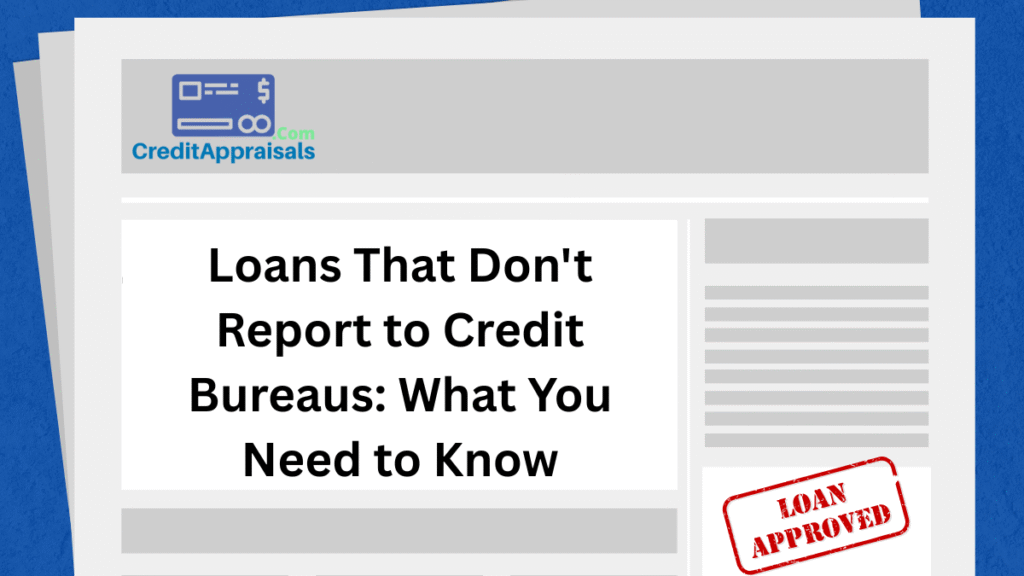Not every loan you take out will show up on your credit report. Some lenders choose not to share your activity with credit bureaus. While that might sound like a good thing, it can work for or against you depending on your financial goals.
If you are trying to build credit, manage debt, or borrow responsibly, it is important to understand how these loans work. This article breaks down what loans do not get reported, why that matters, and whether they are worth it.
What It Means When a Loan Is Not Reported
When a lender does not report your loan, that loan does not appear in your credit history. That means it has no direct effect on your credit score. The three major credit bureaus—Experian, TransUnion, and Equifax—rely on lender data to create your credit file. If the lender keeps that data private, it is like the loan never existed.
This can be both good and bad. It depends on the type of loan and your financial situation.
Why Some Lenders Do Not Report
Not every lender operates like a traditional bank. Many small finance companies, online lenders, or local cash loan providers do not report to credit bureaus. Some do not want the added cost or legal responsibility that comes with credit reporting. Others intentionally stay outside that system.
In many cases, lenders only report missed payments or defaults. So the loan stays invisible unless you fall behind. That is not a good deal if you are trying to build credit. You take on the risk without any credit reward.
Examples of Loans That Usually Stay Off Your Report
Payday loans are the most common example. These are short-term loans with high interest. They are meant to be paid back quickly, often by your next paycheck. Most payday lenders do not report on-time payments, but they might report unpaid debts or send them to collections.
Title loans and pawn loans also fall into this category. These loans are backed by your car or other personal items. If you fail to pay, the lender takes the item. But unless the debt goes into collections, it will not show on your credit report.
Buy now pay later services are another example. Some of these companies are starting to report to credit bureaus, but many still do not. It depends on the provider. And even when they do report, it is not always clear how that information will be used by the credit bureaus.
Private loans from family, friends, or informal lenders almost never get reported. These include handshake agreements or rent-to-own deals. Unless a collection agency gets involved, these loans usually remain off the radar.
When Not Reporting Can Help You
There are times when it is better that a loan does not get reported. For example, if you are facing financial stress and worried about your credit score, a non-reporting loan gives you short-term access to money without hurting your credit. You also avoid a hard credit inquiry, which can drop your score by a few points.
Some people prefer to keep their credit file clean. If you know you will pay the loan off quickly, and you are not building credit at the moment, you might choose a lender that does not report. This can make your credit profile look more stable to future lenders.
The Risks of Non-Reporting Loans
The biggest issue with loans that are not reported is that they do not help you build credit. You could make every payment on time, follow the terms exactly, and still see no improvement in your credit score. That is a missed opportunity.
There is also less oversight with these types of lenders. Since they are not part of the credit system, they might charge higher fees, have unclear repayment terms, or use aggressive collection tactics. And even if the loan does not get reported, falling behind can still have consequences. The debt could be sold to a collection agency, which will report the account and hurt your score.
In short, these loans often carry more risk and less reward.
How to Know If a Lender Reports
The best way to know if a loan will be reported is to ask the lender directly before you apply. A responsible lender will be clear about their reporting practices. If they are vague or avoid the question, that is a warning sign.
You can also look at customer reviews and lender policies online. Well-known lenders, banks, and credit unions usually report to all three credit bureaus. Smaller lenders might not report at all.
Should You Take a Loan That Does Not Report
It depends on your goals and situation. If you are in an emergency and cannot qualify for a traditional loan, a non-reporting option might be your only choice. But use caution. These loans should only be used as a short-term fix, not a long-term solution.
If you want to build or rebuild credit, a loan that is not reported will not help. In that case, look into secured credit cards, credit-builder loans, or personal loans from community lenders. These tools report positive behavior and help grow your score over time.
If you care more about privacy or avoiding a credit inquiry, and you know you can repay the loan quickly, a non-reporting loan might work. Just make sure you fully understand the terms and have a repayment plan.
Final Thoughts
Loans that do not report to credit bureaus can offer fast cash or a little more privacy, but they come with tradeoffs. They do not help your credit score, and in some cases, they can still hurt it if the debt goes unpaid. For borrowers focused on improving their financial future, it is usually better to work with lenders who report on-time payments.
At CreditAppraisals.com, we believe in transparency, education, and helping you make the best financial decisions for your needs. Before you sign any loan agreement, take the time to ask whether the lender reports. That one question can make a big difference in how your financial story gets written.

